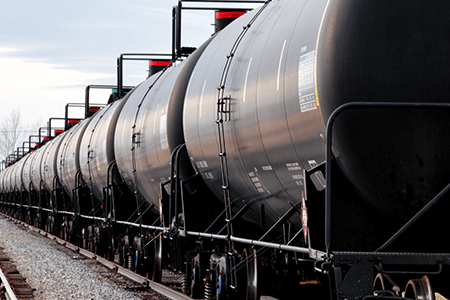The train derailment in East Palestine, Ohio has understandably raised a lot of questions and concerns. Safety, including freight rail safety, is a top priority for the U.S. chemicals manufacturing industry.
- Chemicals support virtually every aspect of our lives—to grow food, protect the safety of our water, make life-saving medicines and equipment, and produce energy, among countless other uses.
- For both the benefit of society and for its protection, it is paramount that chemicals reach their destination safely.
Members of the American Chemistry Council (ACC) are committed to being responsible stewards of their products and good neighbors in the communities where they operate.
Safety is a continual effort. For more than 35 years, our members have implemented Responsible Care® to support and improve continual- environmental, health, safety and security (EHS&S) performance. Through Responsible Care, companies work to protect the health and safety of our people, our communities and our environment.
In fact, Responsible Care companies have a worker safety rate that is nearly five times better than the U.S. manufacturing sector, and almost three times better than the business of chemistry overall.
Rail safety is a shared responsibility. Railroads generally have a strong safety record for transporting chemicals, including those classified as hazardous materials. In fact, 99.9 percent of hazmat shipments are delivered by rail without release caused by a train accident.
Advancing Safety
Safety continues to be a top priority for ACC and its members throughout a product’s lifecycle—from chemical production, to distribution, to its use in commerce.
ACC and its members have consistently worked with policymakers to share our expertise and knowledge, which helps ensure regulations deliver public benefits and allows chemistry to support everyday life.
Our industry is one that rises to challenges and works to provide thoughtful solutions.
- Supporting rail safety & communities: ACC has worked with Congress and the Department of Transportation to encourage adoption of new rail tank cars, including upgrades to cars that transport hazardous materials. Our members also provide critical information and incident training to support first responders during emergencies through industry leading programs like CHEMTREC® and TRANSCAER™.
- Regulating chemicals in commerce: ACC was a major supporter of bipartisan reform to modernize the U.S. Toxic Substances Control Act (TSCA). It was a major update to chemicals management and is designed to enhance safeguards for human and environmental health and safety.
- Securing chemical facilities: ACC championed the Chemical Facility Anti-Terrorism Standards (CFATS), which requires companies to develop and submit security plans to the U.S. Department of Homeland Security (DHS). To date, DHS has reviewed the security profile of more than 40,000 facilities and conducted almost 15,000 security inspections. Further, ACC’s Responsible Care Security Code is recognized by DHS as a SAFETY Act designated technology for helping operational and facility security.
- Enhancing product safety and sustainable chemistry: The chemical industry is innovating new, more sustainable products as well as taking steps to improve safety and risk profiles of existing products. Under Responsible Care’s Product Safety Code, companies continually evaluate and improve product safety and transparently communicate chemical information with stakeholders and the public. ACC also supported the Sustainable Chemistry Research and Development Act, which aims to establish principles of sustainable chemistry and promotes the coordination of federal sustainable chemistry research, education and training.
- Managing safety risks: ACC is a supporter of the current Risk Management Plan (RMP), which requires facilities to assess the potential impacts of chemical incidents and to maintain comprehensive accident prevention and emergency response programs. EPA data shows that RMP incidents have declined by 75% over the past decade.
- Learning from incidents: ACC has also repeatedly called for the right expertise and resources to oversee investigations into chemical safety incidents. The Chemical Safety Board (CSB), which is charged with investigating industrial chemical accidents, conducting root cause analyses, and making enhanced safety recommendations, is highly influential voice and catalyst for safety improvements.
Moving Safety Forward
We have not agreed with every idea or regulation, but there are several ways in which regulations can continue to support the increased safety that our industry strongly encourages.
- CFATS reauthorization: CFATS has proven to be a very effective regulatory tool that should be preserved and has helped forge a strong working relationship between industry and the federal government to advance chemical security. The program will sunset on July 27 unless Congress reauthorizes it. In the name of safety, we can’t let this important program disappear.
- Drone safety: More than 860,000 commercial and recreational unmanned aircraft systems (UAS), commonly referred to as “drones,” are registered in the United States. It’s crucial that we protect critical infrastructure facilities and other sensitive sites from potential safety and security risks posed by a UAS. ACC is calling on the Federal Aviation Administration (FAA) to fulfill its Congressional requirement to adopt rules to protect critical infrastructure, including chemical facilities from drone threats.
- Streamlining new chemicals: New chemicals play a vital role in innovation and the creation of products and technologies needed to accomplish a wide range of critical supply chain, climate, sustainability, energy efficiency, and infrastructure goals. However, EPA routinely misses the statutorily mandated 90-day deadline to review and approve new chemicals under TSCA. EPA meeting its 90-day deadline requirement is very important to R&D, jobs and the development of new sustainable chemistries.
We welcome dialogue on how the public and private sectors can continue to work together to protect our communities. The chemical industry can offer valuable community-specific, highly knowledgeable technical expertise and should be an integral part of discussions to identify effective, workable solutions that make a difference.



